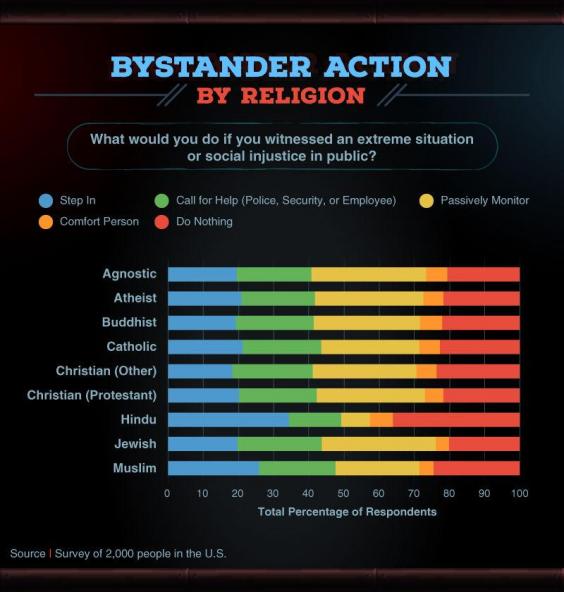As violence and crime continue to surge the world over, the dilemma of witnessing violence or aggression and knowing whether to intervene has become equally common.
While witnessing a violent incident, many aspects are bound to race through a witness’s mind: should one risk his own safety, the authenticity of the incident and the possible negative consequences of intervention.
A survey was conducted to determine how willing people are to intervene in an “extreme situation”, and the survey reaped some interesting results.
The survey titled ‘Bystander Backlash’ questioned 2,000 people and found that a greater percentage of people who identify as Muslims and Hindus said they would take action as opposed to those who identified as Christians.
Only 24 per cent of people said they would take their phones out to capture an incident if they saw a police officer harass an African American, while 21 per cent said they would simply ignore it. A more startling figure showed that nearly twice as many people said they would step in if they saw violence against a dog.

“Witnessing a social injustice in public invokes some kind of fight or flight response in all of us,” company spokesperson Stacia Mullaney said.
“These are immediate, in-the-moment reactions that we wanted to put hard numbers on. We wondered how we might react if we witnessed social injustice or an extreme situation,” she added.
While the firm conducting the survey stressed that it was not aware whether religion played a part in influencing a person’s decision making, Mullaney said other factors too appeared to play a role.
“We found that gender also played a role in how a person responded. Women were slightly more likely to passively monitor a situation, much more likely to call for help, and somewhat less likely to step in,” she said.
“Political affiliation also played a small role. Republicans are about four per cent more likely to call for help, while Democrats were slightly more likely to passively monitor (31%) the situation or provide comfort (6%).”
Courtesy: Independent







